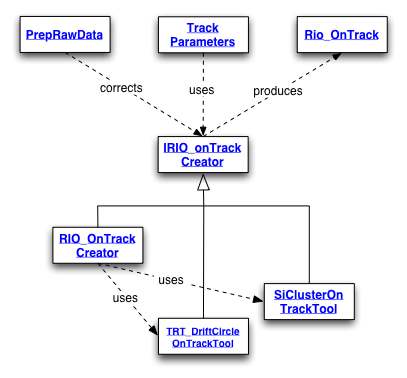 |
ATLAS Offline Software
|
 |
ATLAS Offline Software
|

The RIO_OnTrack Creator encapsulates detector specific calibrations done at the time of the track reconstruction. For precision detectors, calibrations to the measured coordinates can sometimes only be made when additional geometrical information from the track prediction is available. Such calibrations correct, for example, for wire sagging, signal propagation time or varying pitch between microstrips. Hence they fully depend on the detector technology and geometry. The RIO_OnTrack Creator provides a common interface and a wrapper so that the track fitting code can be written in a very general and compact way. High flexibility is maintained by offering a configurable way of including the differen calibrations, and modularity given by removing any dependence on subdetector code from the fitting methods.
The ATLAS EDM distinguishes two types of objects describing measurement hits: Trk::PrepRawData and, further downstream in the reconstruction chain, Trk::RIO_OnTrack. While <nop>PrepRawData provides the measured detector hit as input to any track reconstruction algorithm, the algorithm and detector-specific modifications such as calibration, ambiguity solutions and 3D position information are stored in RIO_OnTrack objects. They are generated during the pattern recognition or fitting and are included in the resulting Trk::Track, which owns the objects. The PrepRawData objects themselves are not (allowed to be!) modified by the tracking algorithms.
The following diagram shows the packages involved in the RIO_OnTrackCreator. By producing Trk::RIO_OnTrack objects from <nop>PrepRawData, the creator tool encapsulates detector specific corrections using a Trk::TrackParameters object to obtain the necessary extra information about the track prediction.

The interface to the calibration tool is defined by a base class, IRIO_OnTrackCreator, and concrete implementations are available for the different detectors by inheriting from this base class. A master tool, RIO_OnTrackCreator, uses those detector specific tools at run-time and provides an elegant interface implementation that allows for all subsystems in one tool.
This interface takes a Trk::PrepRawData and a Trk::TrackParameters object (and hence their derived classes) as input, and the detector-specific tools will then create a new <nop>PixelClusterOnTrack, <nop>RPC_ClusterOnTrack, <nop>TRT_DriftCircleOnTrack, ... object which is passed back as a pointer to the corresponding base class, Trk::RIO_OnTrack.
The Trk::RIO_OnTrackCreator package also contains a tool to correct the intrinsic measurement errors centrally for all track reco code. The corrections - a factor and a term added in quadrature - can tune the tracking with respect to residual miscalibration and misalignments, respectively. They are provided centrally by two COOL folders, /Indet/TrkErrorScaling and /MUON/TrkErrorScaling the scaling is performed by the detector-specific tools at the time of making the <nop>ClusterOnTrack and <nop>DriftCircleOnTrack objects. The scale factors are distinguished by sub-detector and barrel/endcap devices. To avoid wasting computing time, the tool is not called if the job has been started without data from the COOL folder, and the intrinsic errors are left unchanced.
The following calibration corrections are currently implemented:
Since this generic tool and the detector-specific dependants derive from the same interface, the steps to integrate ROT creators are common for both.
Add to the requirements:
use TrkToolInterfaces TrkToolInterfaces-* Tracking/TrkTools
add to header file
#include "TrkToolInterfaces/IRIO_OnTrackCreator.h" private: ToolHandle<Trk::IRIO_OnTrackCreator> m_rotcreator;
pre-initialised this tool-handle in your code as:
m_rotcreator("Trk::RIO_OnTrackCreator/RIO_OnTrackCreator")
This package follows Gaudi-Configurable standards and therefore a RIO_OnTrackCreator is passed to client code via
from TrkRIO_OnTrackCreator.TrkRIO_OnTrackCreatorConf import Trk__RIO_OnTrackCreator
InDetRotCreator = Trk__RIO_OnTrackCreator(name = 'InDetRotCreator',
Mode = 'indet')
ToolSvc += InDetRotCreator
this Mode simplifies configuration by instructing the Trk::RIO_OnTrackCreator to automatically retrieve the detector-specific sub-tools. It takes as parameters the tracking detector realm, so "all", "indet" or "muons" in case that it should be restricted to a given tracking system. The static job options for releases 8 to 12 have been removed.
Two additional python scripts are provided for creating a local SQlite DB, so that the error scaling can be tested and later submitted to the central conditions DB.
This tool is operation since ATLAS offline release 8.3.0.
The technical idea behind the <nop>RIO_OnTrack creator tool is to have a central, configurable and modular tool to transform Trk::PrepRawData objects into Trk::RIO_OnTrack objects. The tool should be fully usable in the tracking core, i.e. by algorithms which only operate on the EDM base classes, and at the same time not create an explicit dependency on detector-specific technologies.
Therefore a master tool is provided in Tracking, which identifies a <nop>PrepRawData object to be Pixel, SCT, ... and calls the appropriate detector-specific tool at run-time, so that an explicit code dependency on the InnerDetector or MuonSpectrometer realms is avoided. The detector-specific tools are under the responsibility of the sub-groups who take care to provide optimal calibration corrections commonly usable to all existing and future tracking algorithms. The master tool and the detector-specific tools all use the same AlgTool interface and inherit from Trk::IRIO_OnTrackCreator, which is in full agreement with the above design goals.
The main ingredient of providing a detector-technology recognition for each <nop>PrepRawData object is the use of AtlasDetectorID (as opposed to a dynamic_cast, which would create a compile-time dependency). Therefore the offline identifiers provided by the <nop>PrepRawData object have to be known to the AtlasDetectorID.
The interface class and the master tool are both contained in the same package. This choice is only motivated by the lack of an extra package to host the interfaces of tracking tools, at the time of deploying the <nop>RIO_OnTrack creation.